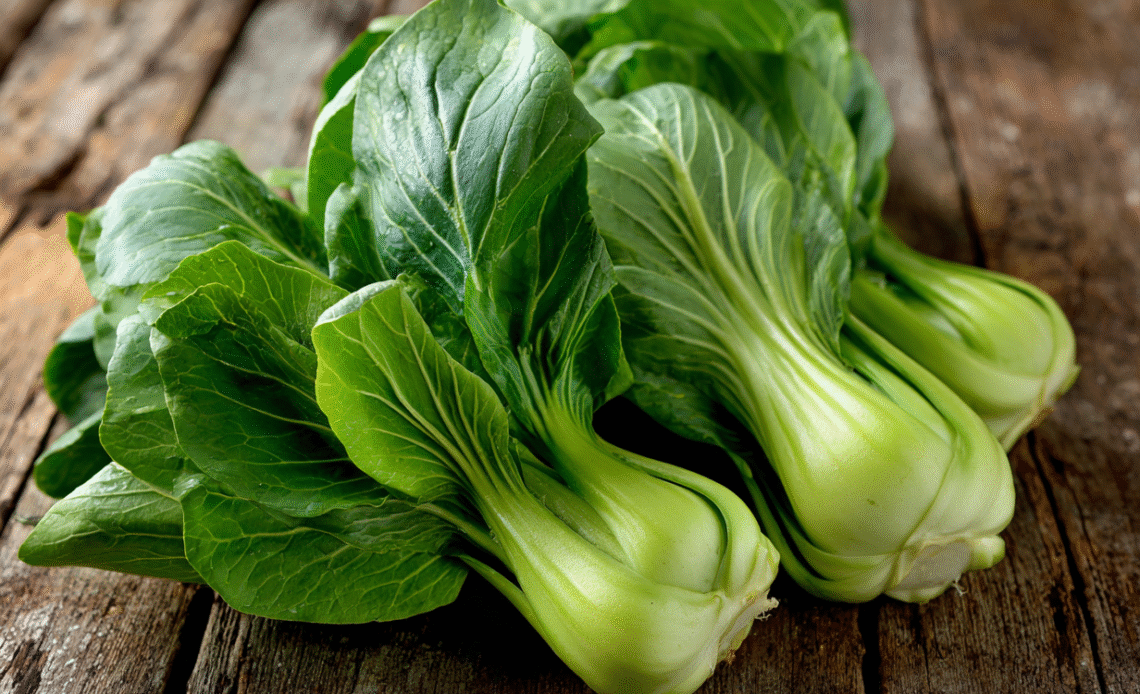Bok choy, also known as Chinese cabbage or pak choi, is a crunchy, mild-tasting vegetable that’s a staple in Asian cuisine and has gained global popularity for its versatility and nutrition. But is bok choy healthy as it seems? According to dietitians and nutrition experts, bok choy is one of the most nutrient-dense vegetables you can eat, packed with vitamins, minerals, antioxidants, and fiber—all while being low in calories.
In this guide, we’ll explore what makes bok choy so good for you, its top health benefits, how to prepare it properly, and answers to common questions.
What Is Bok Choy?
Bok choy (Brassica rapa var. chinensis) is a type of Chinese cabbage belonging to the cruciferous vegetable family, alongside broccoli, kale, and Brussels sprouts.
Types of Bok Choy:
- Baby Bok Choy: Smaller, tender, and slightly sweeter. Ideal for quick stir-fries or steaming.
- Mature Bok Choy: Larger with more fibrous stalks, perfect for soups and stews.
Bok choy healthy is loved for its crisp white stalks and dark green leaves, offering a subtle peppery flavor when raw and a mild, sweet taste when cooked.
Nutritional Profile of Bok Choy
Bok choy healthy is impressively nutrient-dense. One cup of cooked bok choy (about 170g) provides:
- Calories: 20
- Protein: 2g
- Carbohydrates: 3g
- Fiber: 1g
- Vitamin A: 144% of the Daily Value (DV)
- Vitamin C: 74% of the DV
- Vitamin K: 72% of the DV
- Folate: 17% of the DV
- Calcium: 16% of the DV
- Potassium: 11% of the DV
- Magnesium: 7% of the DV
Key Takeaway: Bok choy delivers a powerful dose of essential vitamins and minerals while remaining low in calories and fat.

Health Benefits of Bok Choy
1. Boosts Immune Function
Bok choy healthy is loaded with vitamin C, which supports immune defense and helps your body fight infections and inflammation.
2. Supports Bone Health
Thanks to its high levels of calcium, magnesium, and vitamin K, bok choy healthy helps maintain strong bones and may reduce the risk of osteoporosis.
3. Promotes Heart Health
The potassium and folate in bok choy support cardiovascular health by helping control blood pressure and lowering homocysteine levels—a compound linked to heart disease.
4. Aids in Digestion
Bok choy’s fiber content promotes healthy digestion, supports gut health, and helps maintain a balanced microbiome.
5. Protects Against Chronic Disease
As part of the cruciferous vegetable family, bok choy healthy contains glucosinolates—plant compounds that may reduce the risk of certain cancers by supporting detoxification and reducing inflammation.
6. Improves Eye Health
Rich in vitamin A and beta-carotene, bok choy supports good vision, helps prevent dry eyes, and may lower the risk of macular degeneration.
7. Weight-Loss Friendly
With very few calories but plenty of fiber and water, bok choy is an excellent food for weight management. It helps you feel full without adding extra calories.
How to Cook Bok Choy (Step-by-Step Guide)
Bok choy is easy to prepare and can be enjoyed raw or cooked. Follow these simple steps:
Step 1: Clean Thoroughly
Dirt often hides between the stalks. Separate the leaves and rinse under running water.
Step 2: Trim the Ends
Cut off the bottom root end. For baby bok choy, you can leave it whole or cut in half lengthwise.
Step 3: Choose a Cooking Method
Bok choy healthy can be enjoyed in many delicious ways:
1. Sautéed Bok Choy
- Heat a tablespoon of olive oil in a skillet.
- Add minced garlic and ginger.
- Toss in chopped bok choy.
- Sauté for 3–5 minutes until tender.
2. Steamed Bok Choy
- Place bok choy in a steamer basket over boiling water.
- Cover and steam for 4–5 minutes.
- Season with sesame oil and soy sauce.
3. Stir-Fried Bok Choy
- Stir-fry with other vegetables, tofu, or shrimp.
- Add soy sauce, rice vinegar, and chili flakes for extra flavor.
4. Bok Choy Soup
- Add chopped bok choy healthy to chicken or miso broth.
- Simmer for 10 minutes for a nutrient-rich soup.
5. Raw in Salads or Smoothies
- Chop baby bok choy finely and mix with greens for a crunchy salad.
Flavor Pairings with Bok Choy
Bok choy pairs well with:
- Garlic and ginger
- Soy sauce and sesame oil
- Lemon or lime juice
- Tofu or chicken
- Mushrooms, carrots, and bell peppers
- Chili flakes for spice

Practical Tips for Buying and Storing Bok Choy
Buying Tips
- Look for bright green leaves and firm, white stalks.
- Avoid wilted or yellowing leaves.
- Baby bok choy tends to be sweeter and more tender.
Storage Tips
- Store bok choy in a plastic bag or airtight container in the refrigerator.
- Keeps fresh for up to 5 days.
- Avoid washing before storage to prevent moisture buildup.
Potential Downsides (and How to Avoid Them)
While bok choy is incredibly healthy, a few considerations apply:
- Thyroid Function: Like other cruciferous vegetables, bok choy contains goitrogens, which may affect thyroid function if eaten in very large quantities raw.✅ Solution: Cooking bok choy reduces goitrogens and makes it safe for daily consumption.
- Oxalates: Those prone to kidney stones should enjoy bok choy in moderation, as it contains small amounts of oxalates.
Dietitian Tips for Adding Bok Choy to Your Diet
- Add to soups and ramen for texture and nutrition.
- Blend into smoothies for a mild green flavor.
- Grill or roast for a smoky, caramelized side dish.
- Use in wraps or tacos instead of lettuce.
- Pair with lean protein like chicken or tofu for balanced meals.
Tip: For extra protein, try adding bok choy to stir-fries with tofu, shrimp, or tempeh.
FAQ – Bok Choy Health Questions
1. Is bok choy healthier than spinach?
Both are nutrient-rich, but bok choy is lower in oxalates, meaning your body can absorb calcium more efficiently.
2. Can you eat bok choy raw?
Yes! Baby bok choy is especially good raw in salads or slaws—it’s crisp, mild, and refreshing.
3. How do I cook bok choy without losing nutrients?
Lightly sautéing or steaming bok choy preserves its vitamins and antioxidants better than boiling.
4. Is bok choy healthy good for weight loss?
Absolutely. It’s low in calories, high in fiber, and helps you stay full longer.
5. Can people with thyroid issues eat bok choy?
Yes, in moderation. Cooking bok choy reduces goitrogens and minimizes impact on thyroid function.
6. How often should I eat bok choy?
Bok choy healthy can safely be eaten several times per week as part of a balanced diet.
Conclusion: Is Bok Choy Healthy?
So, is bok choy healthy? Absolutely!
This leafy green is a nutritional powerhouse packed with vitamins A, C, and K, along with minerals like calcium and potassium. It supports bone health, immunity, heart health, and digestion, all while being light, delicious, and easy to prepare.






